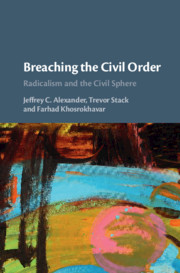Book contents
- Breaching the Civil Order
- Breaching the Civil Order
- Copyright page
- Epigraph
- Contents
- Figures
- Contributors
- Preface
- Introduction
- 1 Wedging Open Established Civil Spheres
- 2 Radical Protest on a University Campus
- 3 Antiracism Movements and the US Civil Sphere
- 4 The Civil Sphere and Its Variants in Light of the Arab Revolutions and Jihadism in Europe
- 5 Restaging a Vital Center within Radicalized Civil Societies
- 6 Anti-immigrant Movements and the Self-Poisoning of the Civil Sphere
- 7 The Civil Sphere and Revolutionary Violence
- 8 “We All Came Together That Day”
- 9 Disobedience in Civil Regeneration
- Commentary
- Conclusion
- Index
- References
6 - Anti-immigrant Movements and the Self-Poisoning of the Civil Sphere
The Case of Germany
Published online by Cambridge University Press: 25 November 2019
- Breaching the Civil Order
- Breaching the Civil Order
- Copyright page
- Epigraph
- Contents
- Figures
- Contributors
- Preface
- Introduction
- 1 Wedging Open Established Civil Spheres
- 2 Radical Protest on a University Campus
- 3 Antiracism Movements and the US Civil Sphere
- 4 The Civil Sphere and Its Variants in Light of the Arab Revolutions and Jihadism in Europe
- 5 Restaging a Vital Center within Radicalized Civil Societies
- 6 Anti-immigrant Movements and the Self-Poisoning of the Civil Sphere
- 7 The Civil Sphere and Revolutionary Violence
- 8 “We All Came Together That Day”
- 9 Disobedience in Civil Regeneration
- Commentary
- Conclusion
- Index
- References
Summary
In 1945, even before the dust of the war had settled, the English historian A. J. P. Taylor remarked that in Germany, land of the middle, things could never be kept to the middle of the road; everything seemed to tend toward extremism: “The history of the Germans is a history of extremes. It contains everything except moderation” (Taylor 1945:13). For a long time, the strong undercurrent of idealistic universalism and cosmopolitanism that runs through German intellectual history did not translate into the consolidation of democratic institutions and a robust civil sphere. Instead, the land of the middle has produced the most murderous form of fascism and an extremely repressive version of postwar socialist dictatorship in Europe. While being radically different in some respects, both the political systems of Nazi Germany and the German Democratic Republic (GDR) were based on the destruction of the civil sphere and the systematic nurturing of suspicion toward outsiders and foreigners that poisoned the wells of human relationships and civil solidarity.
- Type
- Chapter
- Information
- Breaching the Civil OrderRadicalism and the Civil Sphere, pp. 145 - 169Publisher: Cambridge University PressPrint publication year: 2019
References
- 3
- Cited by



